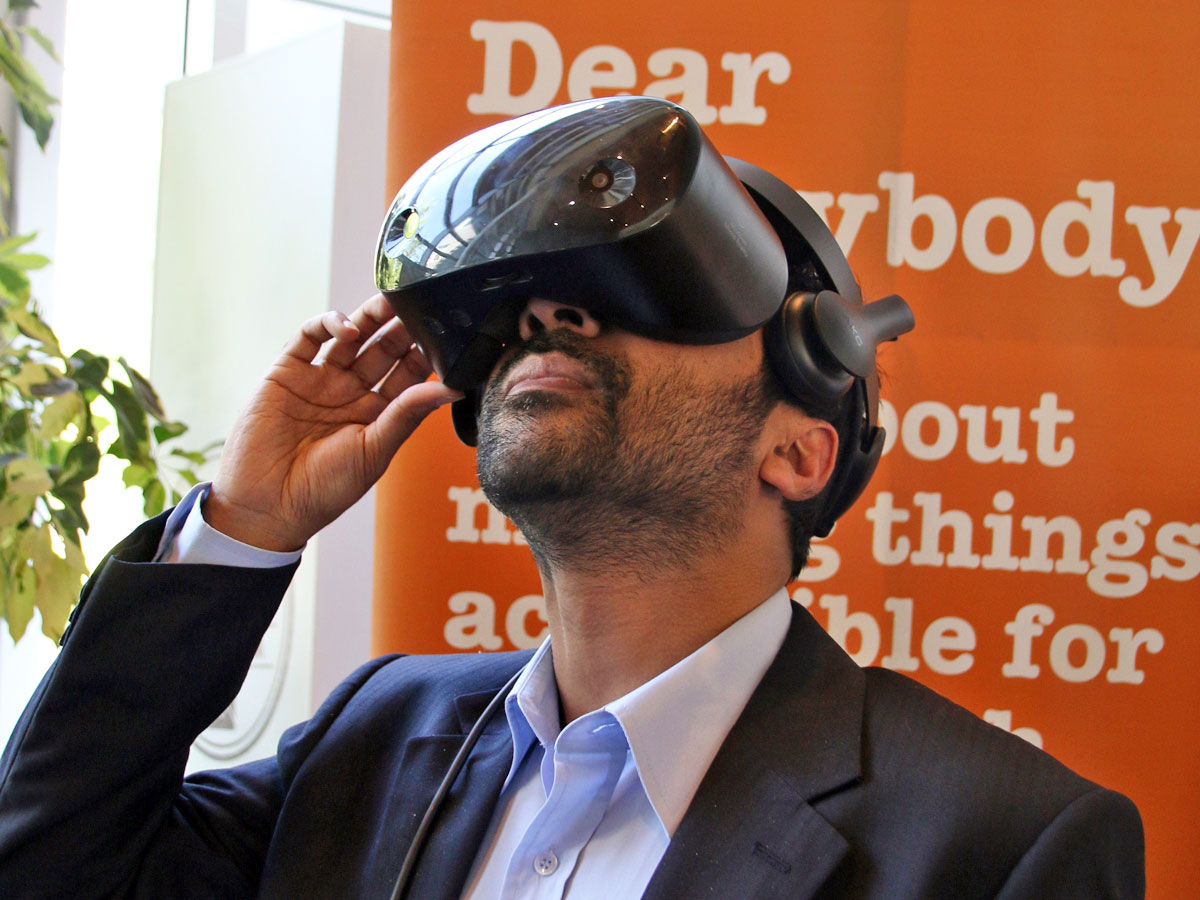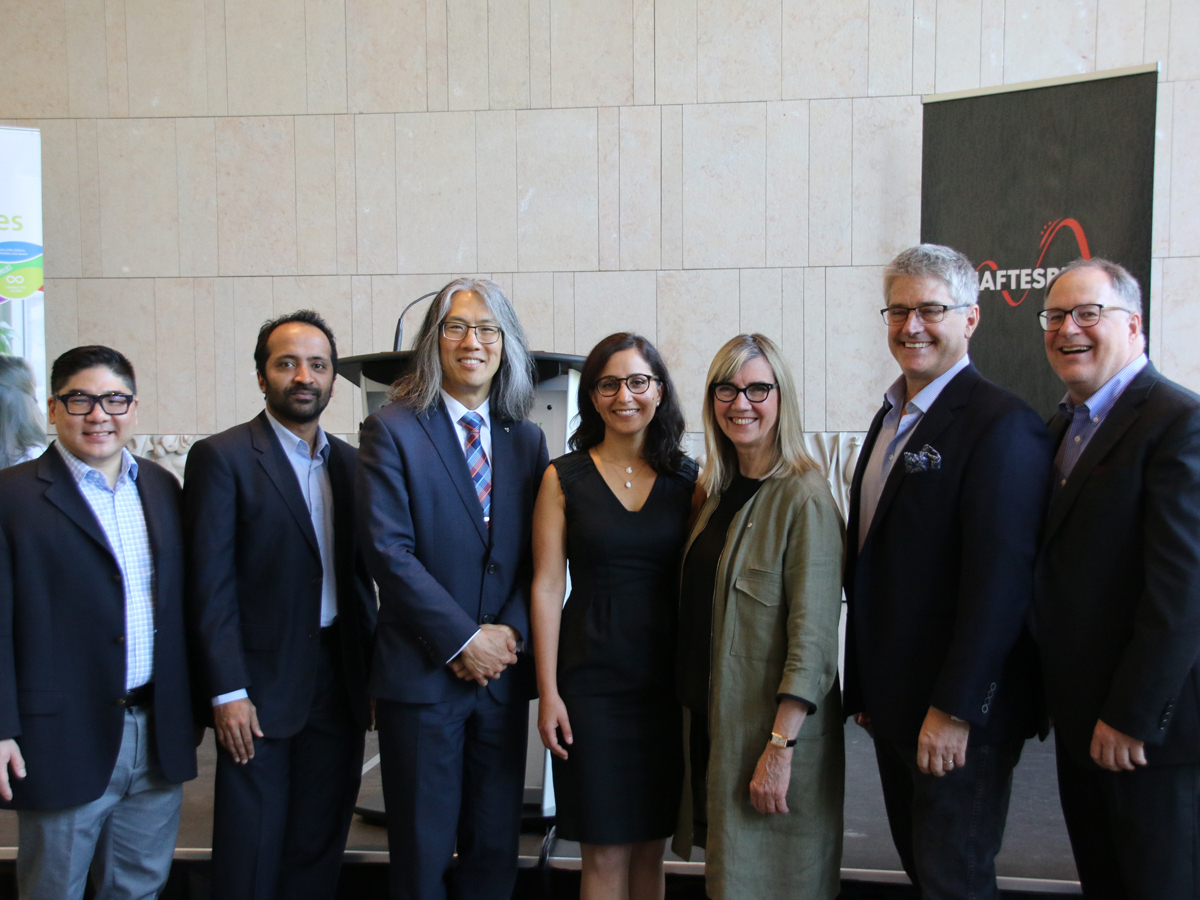Ryerson researchers game to help therapeutic virtual reality project

Ryerson University professor Naimul Khan tests one of the virtual reality games designed by Shaftesbury to help reduce stress in children before medical procedures and surgery.
Ryerson University researchers from the department of electrical, computer and biomedical engineering are collaborating on a project with entertainment company Shaftesbury (external link) . The aim is to use virtual reality games to alleviate some of the stress and anxiety children experience when undergoing medical procedures and surgery. The Ryerson researchers, Naimul Khan, Sri Krishnan, Ling Guan and their research teams are developing an artificial intelligence component to the project that will help devices respond to a user’s emotional state by reading vital signs like their heart rate.
The partnership between Ryerson and Shaftesbury was announced at Holland Bloorview Kids Rehabilitation Hospital on June 6 and will explore the use of immersive media like virtual reality games with partners Holland Bloorview Kids Rehabilitation Hospital (external link) and the Scarborough Health Network (external link) . The project with the Scarborough Health Network aims to reduce stress for children before surgery, and the Holland Bloorview project is examining the usability and safety of virtual reality technology by children with autism spectrum disorder.
Professor Khan, the director of the Ryerson Multimedia Research Laboratory – who was one of the speakers at the event – was invited to collaborate on the project by Ted Biggs, Shaftesbury’s vice president of technology. The pair has worked together on previous entertainment projects, but this project will be their first collaboration applying games to healthcare, says professor Khan. The Ryerson portion of the project is still in the development stage, and the university’s research team has been involved for about a year. They’re working to add affective computing principals to the virtual reality games being developed. Affective computing allows the devices to respond dynamically to the user’s emotional state through artificial intelligence.

Representatives from Shaftesbury, the Scarborough Health network, Holland Bloorview Kids Rehabilitation Hospital and Ryerson University gathered at Holland Bloorview on June 6 to give an overview of their work on virtual reality games for health purposes.
“The idea is that we capture data from a wide range of biometric and biomedical sensors. From this we are able to make a series of accurate readings of emotional states, including of stress and engagement levels whether or not an experience is working. To do this you have to have heavy usage of AI,” said professor Khan.
Shaftesbury’s Ted Biggs says it’s been more than two years since the entertainment company first started working on immersive reality for therapeutic purposes and more than three years since the company’s research arm started examining health and wellness for children. Shaftesbury has been very targeted in selecting its research partners, he says.
“We found passionate researchers. We think the Ontario researchers we’ve been working with are some of the best in the world,” he said in an interview. During the event, he said they realized frontline workers and clinicians had to set the agenda.
Dr. Michael Chang, the division head of otolaryngology, Centenary Hospital, Scarborough Health Network, and the primary investigator of the study looking at using a positive distraction system before surgery, said that often the focus is on relieving pain symptoms but not addressing feelings of anxiety.
“We also believe that anxiety is a symptom that is often overlooked, and we think that if we can decrease anxiety, we can improve health outcomes,” he said in an interview.
Dr. Chang says the first phase of the research project is almost complete. This phase involved recruiting volunteers and studying their experience with the virtual reality games versus regular play before surgery.
The second phase, which Dr. Chang hopes will be complete by early 2020, involves clinical trials.
“So far, the results have been positive and we’re optimistic,” he said of the study, which he says is one of the first of its kind.